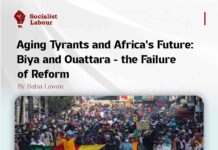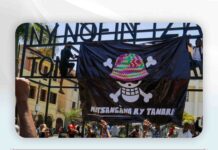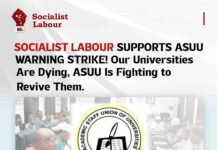There is a widespread myth that the role of armies is to protect the nation (the people). In fact, the historic role of armies is to protect the ruling class from the people and any competitive rulers in the neighbourhood.
When was the last time that the Nigerian army was used to defend ‘the country’ from foreign aggressors? In contrast, we all remember October 2020 and the Lekki massacre when, once again, the army’s guns were used to massacre a protest of local youth.
The role of the army is always to protect the ruling class from opposition. It is used to protect Nigerian businesses at home and across the continent – this is why it has intervened in Liberia, Sierra Leone etc to make West Africa safe for business/capitalism, specifically UBA, other banks and Dangote Cement.
The Nigerian army originated during the British conquest of Nigeria. Local young men were recruited to subdue local rulers. The invasion of Sokoto, for example, was undertaken by Nigerian troops (led by a few British officers). The point of the invasion was to stake out the agreement of the Berlin Conference with boots on the ground – to mark out the border between British and French West Africa.
For many years, the army was used to subdue local insurrections including for example the Aba women’s riots. The armed might of the state continues to be used to impose the rule of the corrupt rich elite over the majority of the population. This is clear in the case of the Lekki Massacre.
On a world scale the main opposition to neoliberal capitalism is Islamic Fundamentalism. This is reflected across West Africa where from Mali to Niger, over the last decade or so, there have been a variety of insurrections based on various Islamic groups. In Mali, as in NE Nigeria, they succeeded in taking control of vast swathes of the country, before being pushed back with support of French and other foreign troops.
Part of the reason for the rise of Islamic fundamentalism is the failure of the left and the trade unions in the fight against’ inequality. Our numbers are measured in tens or at best hundreds. But hundreds of thousands of mainly young men have actively supported the various Islamic armed groups across West Africa. Poverty and inequality have pushed these people into taking desperate measures.
Each year hundreds of thousands of young people leave universities and most fail to obtain decent jobs related to their qualification. Their families have invested heavily in their education only to have their hopes of a better life dashed. Is it any wonder that at least some see “Western Education” as a cruel con trick?
Armies across the world have been unable to crush such mass based uprisings. The US failed in Vietnam and Afghanistan. The French have failed in Mali over the last eight years. The Nigerian (and Chad and Niger) army has failed to bring peace to the NE of Nigeria.
In fact, every massacre by the army has helped to recruit to Boko Haram. The IDP camps, where funds for food are stolen by the local elite, are another recruitment ground.
The role of the army remains to protect the interests of the corrupt elite at home and abroad. Any suggestion that the army could defeat Boko Haram and other “terrorists”/bandits is mistaken. The fundamental cause of insecurity – inequality, poverty and corruption – have to be removed.
It is perhaps inevitable that the coup leaders in Burkina Faso, and previously Mali, gained mass support with huge demonstrations. The coups removed corrupt leaders and claimed to want to fight more effectively against insecurity and the armed Islamic fundamentalist groups. But, as the statement by the trade union centres in Burkina Faso shows, there is also widespread opposition to intervention in politics by the army. Whether under military dictatorship or a civilian regime, workers have to organise effectively to protect their livelihoods. The army is no solution for the mass of the poor people.
We are never in support of ‘our’ army as we know its origins and current role is to suppress any opposition to the dominant ruling class. We know that the army has killed as many civilians in the NE as Boko Haram. The two groups are equally armed thugs that terrorise the local populations. When two elephants fight the grass gets trampled.
We have to try and re-build the strength of the trade unions with popular support to start winning strikes. Inequality, poverty and corruption have increased over the last few decades, locally and globally (as the recent Oxfam report shows), this is the fundamental cause of insecurity. We can change this situation if the trade unions can begin to win. Governments are still terrified of the trade unions when they take active and determined action, the brief strike in Kaduna last year and the recent threat of protests in all state capitals shows that.
We have to argue for the trade union movement to really fight for poor working people! No price fuel increases! No electricity price increases! A decent minimum wage for all!
To join the Socialist Labour supporters WhatsApp group click: https://chat.whatsapp.com/FEnciltnJuV1kk84xihl5I






